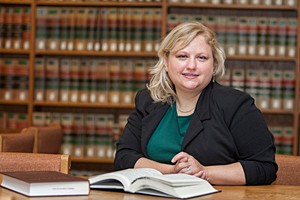
UC Research Examines an Emerging Issue: Treatment of Transgender Prison Populations
Prison policies vary on treating transgender inmates, which could put inmates and institutions at risk.
Gina Gibbs, a University of Cincinnati criminal justice doctoral student, will present a synopsis of the legal issues posed by such inmates at the annual meeting of the American Society of Criminology. The national conference runs from Nov. 19-22 in San Francisco.
At the center of the debate are Eighth Amendment protections against cruel and unusual punishment, widely varying policies on the treatment of transgender populations and, Gibbs says, court crackdowns on prison systems, ordering them to fix a problem that they dont know how to approach.
In Gibbs paper, titled, Protecting the Punks, the Queens and Those in Between, she states that the word transgendered is just now emerging in prison research and literature, despite evidence that transgendered inmates have always been a part of the prison population. She states that in years past, transgender inmates had been referred to as punks or queens by the general prison population.
The most significant issues the transgendered pose to prison staff concern booking and processing procedures, housing selection and safety, security lockdown, daily rule infractions and health care concerns, Gibbs states in the paper. Gibbs says that includes varying policies regarding body searches, clothing allowances, segregation procedures, as well as issuing diagnosis and health care treatments. Despite the numerous issues arising from these inmates, administrators and legislators continue to ignore them by refusing to develop cohesive policies, making employees and institutions vulnerable to costly litigation and court interference.
Gibbs says the Chelsea Manning case shed an international spotlight on the issue, when a U.S. soldier, born as Bradley Manning, was convicted of espionage in 2013 for leaking classified U.S. documents. Manning, who identifies as female, is seeking hormone replacement therapy from a military prison after receiving a 35-year sentence. Despite a diagnosis of gender dysphoria, Manning has been refused the medically recommended treatment and has turned to the courts for assistance.
Gender dysphoria is considered a medical condition, says Gibbs. When the Eighth Amendment is applied to ignoring excessive medical conditions, prisons can be held liable. Yet its not clear whether hormone treatments should be required, because the U.S. Supreme Court is not clear on how to define transgendered.
Gibbs adds that the majority of the transgender population is anatomically male but identifies as female.
Gibbs says that the ultimate goal of her research is to apply her legal background to create a manual to guide prison institutions and administrators in dealing with transgender populations. Additionally, she hopes to develop principles of effective intervention specifically designed for the transgender population, including identifying the most effective risk assessment procedures, as well as identifying common response barriers. She also works in the UC
Center for Criminal Justice Researchs Corrections Institute (UCCI)
. UCCI works to promote effective interventions and assessments for adult and juvenile offenders. Gibbs also holds a J.D. from Catholic University in Washington, D.C.
Presenting at a conference session focused on the perceptions and treatment of transgender populations, Gibbs hopes to start a national discussion among the research community.
My goal is to support both sides, Gibbs says. We have a constitutional duty to provide proper treatment for inmates. On the other hand, with these varying policies, prison administrators need to be protected from liability.
Gibbs concludes that, Certain groups within the inmate population are known for causing greater difficulty and therefore require clear-cut policies addressing issues specific to them. The transgendered population is one such group. Often, these separate policies are not developed until a crisis occurs, such as an inmate stabbing or violent rape, which requires administrators to act. Prior action indicates that administrators and Department of Corrections officials will once again wait for a crisis before addressing the issues created by transgendered inmates.
The American Society of Criminology is an international organization dedicated to pursuing scholarly, scientific and professional knowledge concerning the measurement, etiology, consequences, prevention, control and treatment of crime and delinquency. The theme of the 2014 annual meeting is Criminology at the Intersections of Oppression.
UCs nationally ranked
in the
College of Education, Criminal Justice, and Human Services
(CECH) holds the No. 1 ranking for research productivity and recognition in U.S. News & World Report as one of the top three doctoral programs in the nation.
Related Stories
WLWT: UC students experience realities of life in prison as part...
May 1, 2024
One day a week, eight UC students travel to the institution as part of the Inside-Out Prison Exchange Program, where they and eight incarcerated individuals discuss criminal justice topics such as sentencing, parole, life after prison and recidivism in a classroom setting. The program is part of a class taught by J.Z. Bennett, an assistant professor of criminal justice.
UC IT students recognized for achievement in cooperative...
April 30, 2024
University of Cincinnati School of Information Technology students excel in real-world work experiences. Three of the school's students were honored this spring. Learn more about the students - Josh Anness, Hamza Rauf and Pavan Gujjarlapudi.
UC alumni and friends make a big impact on UC Day of Giving
April 29, 2024
24-hour challenge raises more than $3.8 million to support scholarships, drive innovation, and help the UC community continue to thrive.
